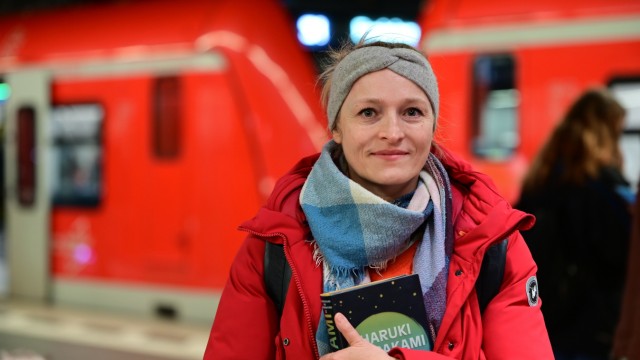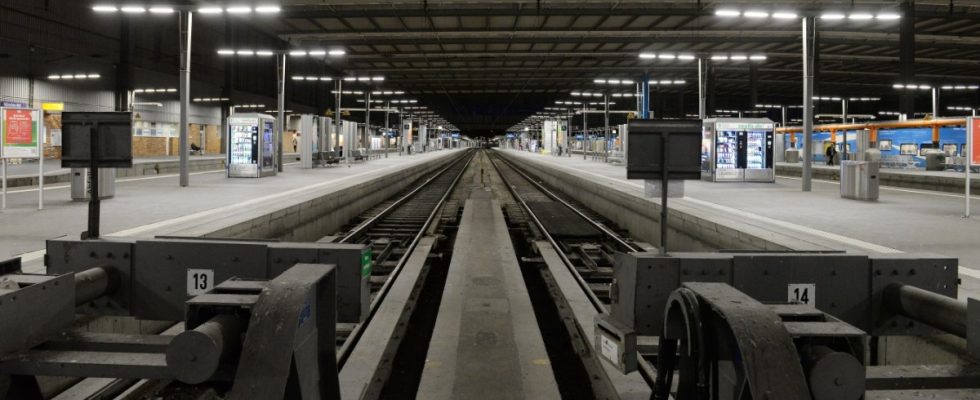Jan-Henning Krumme stands on platform 18 at Munich Central Station, cell phone in hand. Next to him is a small rolling suitcase with a backpack on top. He has to go to Berlin on business, but that’s not that easy on Wednesday. The six-day warning strike by the train drivers’ union GDL started last night and the timetables have been significantly reduced. Krumme actually didn’t want to go to the capital until the evening.
Jan-Henning Krumme has to go to Berlin on business and has little sympathy for the strikers.
(Photo: Robert Haas)
Taking the car is not an option for him, and he doesn’t want to fly either. So all that remains is the train. And it’s supposed to leave for Berlin shortly before nine in the morning. “This is probably one of the few trains running today,” he says. On Friday he will face the drama again in a different direction, because he has to return to Munich – and Deutsche Bahn will probably still be on strike. Krumme is anything but happy with the strike: “I think it’s a disgrace that they can’t sit down and negotiate.”

Teacher Bettina Keil cannot easily switch to another mode of transport with her students.
(Photo: Robert Haas)
A few meters further along the track there is a group of around twenty people, students from a vocational school in Munich with two teachers. You want to go to a trade fair in Berlin. “It was all planned and booked a long time ago,” says teacher Bettina Keil. That’s why she wasn’t able to spontaneously switch to another means of transport with her students. Nevertheless, she tries to take the situation with humor: “We don’t shy away from a challenge,” she says and laughs. In principle, Keil understands the train drivers, but she is critical of the length of the strike.
The GDL train drivers will stop working for a total of six days, the union announced on Sunday night. A railway spokeswoman announced on Wednesday morning that there would be massive disruptions to all long-distance and regional traffic up to and including next Monday. The railway has set up an emergency timetable for long-distance, regional and S-Bahn traffic, which started as planned in the morning.
According to Deutsche Bahn, the aim is also to run a greatly reduced offer in regional transport. The strike also brings restrictions for S-Bahn operations in Munich. Some lines run every hour, others are canceled completely.

Dajana Fischer depends on the S-Bahn.
(Photo: Robert Haas)
Dajana Fischer stands with a book in her hand on the platform deep beneath the main train station. She is on the way to work and has to go to Rosenheimer Platz. This means that Fischer has an almost optimal route to work on this day of the strike – because every train that travels on the main route stops at this station. “I had read that the S-Bahn was canceled, but also that there would be a train every hour. I just stood there and thought I’d wait for a train to come,” she says. And will soon be able to board an S-Bahn, whose doors will be flanked on Wednesday by staff in yellow high-visibility vests.
Fischer is divided about the strike. She understands that the GDL is demanding more money. On the other hand, she is annoyed about the length of the strike. “This is difficult for rail customers,” she says. She is a mother herself and takes her children to daycare using public transport. “The strike makes things more complicated.”
This is the fourth labor dispute in the collective bargaining dispute that has been going on since November and, at six days, the longest. In addition to financial demands, the dispute primarily revolves around reducing weekly working hours for shift workers. The GDL wants to reduce this from 38 to 35 hours while keeping the salary the same.
Among the angry but prepared passengers, there are also those who were surprised by the strike. Like Charlotte Goring. The Brit was on a skiing holiday in Austria, she says. Now she is standing at the rather empty main train station in Munich and is waiting for an ICE that will take her towards Stuttgart. She too had decided against flying and instead taking the train – from Stuttgart she would go on to Paris and then underground by train to London. This has now become a journey with a lot of uncertainty, especially on the last stretch: “I hope they let me use the original ticket for the train to London,” she says.

The Brit Charlotte Goring has to be back in London on Thursday – she doesn’t know yet whether she can make it by train.
(Photo: Robert Haas)
The young woman alternately looks at her cell phone and then back at the display on the track. “It’s unfortunate,” she says. She still understands the situation. Furthermore: “It’s nothing special for me that there’s a strike; it happens more often in Great Britain.” Rail strikes have also been announced on the island for the end of January. And while Goring is still waiting to catch a train towards Stuttgart, Jan-Henning Krumme and the vocational school class on platform 18 are actually getting started. At 8:50 a.m. the train conductor’s whistle shrills across the track, at least this ICE is heading towards Berlin.

